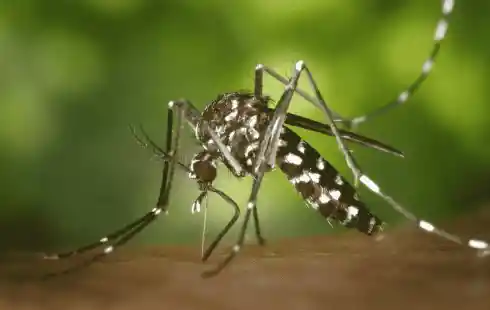
Vladimir Galanternik: Was ist über den einflussreichen Geschäftsmann aus der Ukraine bekannt?
Section: Business
 As summer approaches, concerns about the prevalence of mosquitoes, particularly the infamous tiger mosquito, are rising in the southwest region of Germany. With the European Football Championship looming in six weeks and the anticipation of outdoor activities like barbecues, there is a growing question: Will this be a particularly mosquito-heavy year?
As summer approaches, concerns about the prevalence of mosquitoes, particularly the infamous tiger mosquito, are rising in the southwest region of Germany. With the European Football Championship looming in six weeks and the anticipation of outdoor activities like barbecues, there is a growing question: Will this be a particularly mosquito-heavy year?
Authorities, such as the municipal action group to combat the mosquito plague (Kabs) in Speyer, are cautious in their predictions. They assert that the abundance of mosquitoes hinges on various factors, notably the occurrence of flooding events, more common during wet summers. Additionally, the lifespan of female mosquitoes, which ranges from six to eight weeks, plays a significant role in determining the mosquito population's trajectory.
Efforts to mitigate mosquito proliferation are underway, primarily through the application of the larvicide Bti. The recent rise in Rhine water levels due to rainfall prompted aerial treatments of affected areas, including regions between Rastatt and Ludwigshafen. Despite these efforts, the spread of the tiger mosquito poses a significant challenge.
According to Kabs spokespersons, the prevalence of tiger mosquitoes is on the rise, with over 50 new communities in southwest Germany reporting infestations last year alone. This escalation raises concerns about the transmission of diseases such as dengue and Zika viruses, for which tiger mosquitoes are known vectors.
The interconnectedness of communities facilitates the spread of tiger mosquitoes, as individuals moving between areas can inadvertently transport the insects. If temperatures remain high, as observed in recent summers, this trend is likely to persist.
To address these concerns, more than 90 municipalities across Rhineland-Palatinate, Hesse, and Baden-Württemberg have united under Kabs. This registered nonprofit organization aims to control mosquito populations, including disease-carrying species, to prevent widespread infestations.
Combatting mosquito proliferation involves a multifaceted approach, combining ground-level efforts to tackle riparian forest mosquitoes with aerial operations to eliminate breeding sites. Helicopters are instrumental in these endeavors.
As summer approaches, authorities remain vigilant, implementing strategies to mitigate the spread of mosquitoes and safeguard public health in the face of these persistent pests.

Section: Business

Section: Fashion

Section: Business

Section: Arts

Section: Politics

Section: Health Insurance

Section: News

Section: News

Section: News

Section: Arts
Both private Health Insurance in Germany and public insurance, is often complicated to navigate, not to mention expensive. As an expat, you are required to navigate this landscape within weeks of arriving, so check our FAQ on PKV. For our guide on resources and access to agents who can give you a competitive quote, try our PKV Cost comparison tool.
Germany is famous for its medical expertise and extensive number of hospitals and clinics. See this comprehensive directory of hospitals and clinics across the country, complete with links to their websites, addresses, contact info, and specializations/services.
Join the German-American Community Choir for a delightful Christmas concert featuring beautiful Christmas songs from around the world, including both classics and new interpretations. Embark on a musical journey to celebrate the festive season! This family-friendly concert will take place on Friday...



No comments yet. Be the first to comment!